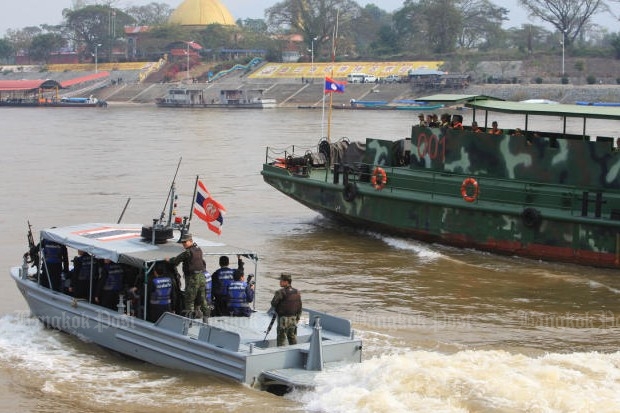
One of the five major drug smuggling groups operating in the region has been crushed and its 26 networks destroyed by the Safe Mekong Joint Operation, Justice Minister Paiboon Koomchaya announced on Wednesday.
Gen Paiboon was briefing the media on progress in the third phase of the Safe Mekong project, which began in January, in which Cambodia and Vietnam joined with Thailand, China, Myanmar, Laos, Cambodia and Vietnam. It continues until 2018.
He said during the past two years under the Safe Mekong project, the Office of Narcotics Control Board (Oncb) and Narcotic Suppression Bureau (NSB) have destroyed one major drug smuggling group running 26 networks, leading to the confiscation of drug-related assets by the Anti-Money Laundering Office (Amlo).
There were now four major drug smuggling groups with 34 networks remaining in operation.
One of the four remaining groups is in Thailand and the three others in neighbouring countries with ethnic minority groups.
The countries under the Safe Mekong project continued to exchange information on the groups for use in drug suppression operations, Gen Paiboon said.
The justice minister said after the Myanmar government appointed new ministers in charge of the ministries of border affairs, health, and home affairs, he had consulted them over the joint proposal made by China, Myanmar and Laos, that the Safe Mekong project lay down a long-term strategy to combat drug smuggling by sealing off the Golden Triangle, a main drug-producing area straddling the border mountains of Myanmar, Laos and Thailand.
Gen Paiboon said he had also forwarded the proposal to Asean for inclusion on regional organisation's agenda, because the issue had never been discussed separately from other border problems.
He said he would ask Malaysia, Brunei and Singapore to also provide support.
Gen Paiboon said Thailand would also request the United Nations Office on Drugs and Crime (UNODC) to provide funding for the purchase of equipment necessary for drug suppression operations. Cash donations would particularly be sought from South Korea, Japan, Australia, Germany and the United States for this purpose.


